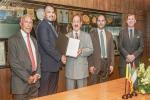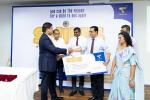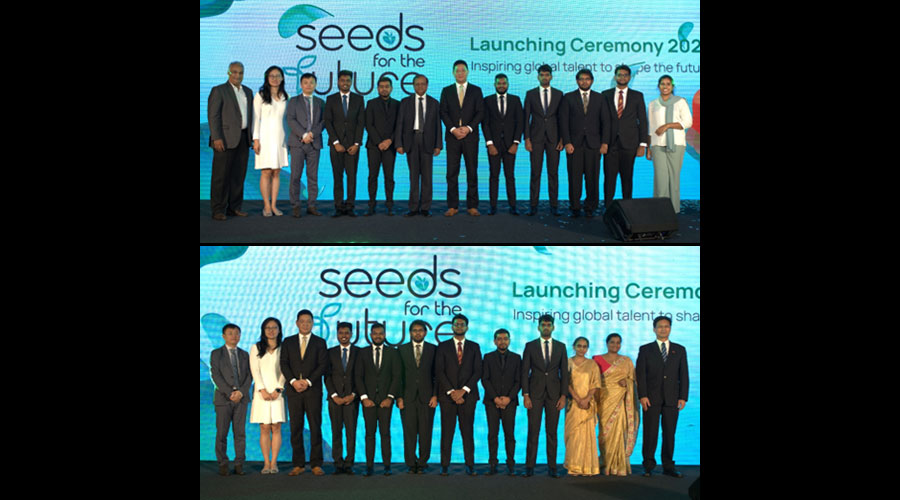The event was attended by distinguished guests, including representatives from the Ministry of Education, the Chinese Embassy in Sri Lanka, the University Grants Commission, university deans, and heads of departments.
The spotlight was on six promising students selected for this year’s program, who were present along with their parents.
In his welcome speech, Mr. Zhang Jinze, CEO of Huawei Sri Lanka, highlighted that over the years, more than 100 university students across Sri Lanka have benefited from the Seeds for the Future program, contributing their unique ideas and ambitious dreams.
“Through this program, we offer young Sri Lankan youths the opportunity to experience Huawei’s cutting-edge technology and best practices, along with a rich cultural immersion into Chinese traditions.
Therefore, I hope that after completing this short-term ICT course, these students will return and share their newly acquired knowledge, thereby contributing to Sri Lanka’s journey towards becoming an ICT hub in South Asia.,” he noted.
The event also featured an inspiring address by Dr. Susil Premajayantha, Minister of Education, who congratulated the selected students and shared his experiences visiting Huawei’s headquarters in China.
He highlighted the invaluable opportunity awaiting the students, stating,
“These six students are going to witness firsthand how China and Huawei are leading the ICT-driven world through this program as I did.
They will partake in short courses on 5G, AI, Digital Power, and Cloud technologies. It’s a remarkable exposure for young talents to visit Shenzhen, Shanghai, and Beijing, epicenters of technological innovation.”
Dr. Premajayantha also mentioned his visit to Huawei’s state-of-the-art library and exhibition hall, which features cutting-edge technologies and smart city solutions.
He remarked, “Huawei’s dedication to R&D, demonstrated by their investment of 40% of profits into innovation, is something our young talents should see and learn from.
I am confident that initiatives like these will enhance collaborations between Sri Lanka and Huawei, paving the way for future opportunities as there will be many more partnerships with Huawei in the years to come,” he said.
H.E. Qi Zhenhong, Ambassador of the People’s Republic of China to Sri Lanka, also graced the occasion to acknowledge and congratulate the students.
In his address, Ambassador Zhenhong emphasized the program’s role in strengthening ties between China and Sri Lanka.
“Since its launch in Sri Lanka in 2016, Huawei’s Seeds for the Future project has actively cultivated a large number of outstanding ICT young talents, benefiting over 100 students.
This program not only contributes to deepening China-Sri Lanka cooperation and friendship but also equips students with the opportunity to learn cutting-edge technology firsthand in China,” he remarked.
Ms. Apsara Caldera, Additional Secretary to the Minister of Education – Higher Education Section (Development), echoed these sentiments, highlighting the rigorous selection process for the program.
“The chosen students exemplify the high standards and potential that Seeds for the Future seeks to cultivate.
This program is a beacon of what can be achieved through dedication and global collaboration,” she said.
This year’s Seeds for the Future awardees include Chamod Fernando from the University of Wayamba, Praveen Sumanasekara from the University of Peradeniya, Isuru Samaranayake from the University of Sri Jayewardenepura, Avishka Chanuka from the University of Kelaniya, and Sadeesha Sathmina and Thisara Gunawardana from the University of Moratuwa.
The program will provide an intensive 8-day training session in China, covering cutting-edge ICT technologies, scientific and technological leadership, discussions on global topics, and Tech4Good group projects.
Launched in Thailand in 2008 and introduced in Sri Lanka in 2016, the Seeds for the Future program has expanded to 139 countries and regions worldwide, attracting over 15,000 students.
It remains one of Huawei’s most impactful initiatives, contributing significantly to the development of future ICT leaders.






















